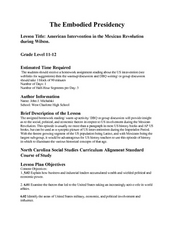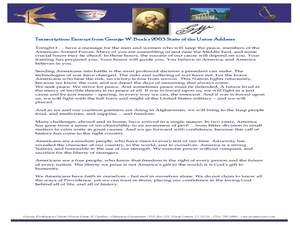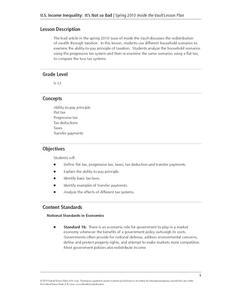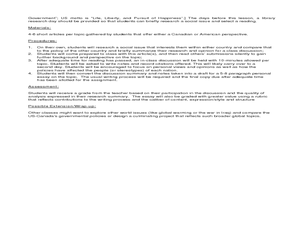Curated OER
Separation of Powers
Students examine the roles of each of the branches of U.S. government. In this checks and balances lesson, students watch Discovery video segments and discuss the concept of federalism as they create a school-wide policy for government...
Curated OER
The Embodied Presidency Wilson
Young scholars take a closer look at U.S. intervention in Mexico. In this 20th century history lesson, students examine primary documents to consider why the United States entered the Mexican War and then write DBQ essays on the topic.
Curated OER
The Philippines-U.S. Involvement
Young scholars research and discuss the rational for U.S. involvement in the Philippines. They discuss overall foreign and domestic policies of the U.S. Then they create a timeline that highlights this impact.
Curated OER
George Washington's Foreign Policy
Learners compare George Washington's foreign policy to the policies of presidents who followed him. In this primary source analysis lesson, students compare Washington's Farewell Address to the Roosevelt Corollary, the Monroe Doctrine,...
Curated OER
Patriotism and Foreign Policy
Twelfth graders create a museum of Patriotism and Foreign Policy. They participate in discussions and work in committee's to determine which objects shall be displayed in the museum. They present visual and performing arts along with...
Federal Reserve Bank
U.S. Income Inequality: It's Not So Bad
What is the difference between a flat tax, progressive tax, tax deduction and transfer payments? Pupils examine the ability-to-pay principle of taxation through discussion, problem solving, and a variety of worksheets on topics from US...
Curated OER
The Impact of the IWW on the Nation or Who were the Wobblies?
Learners evaluate the role labor groups had on the U.S. Government in the early 1900's. In this teaching American history instructional activity, students complete several activities, including response writing and listening to music,...
Curated OER
Tibet and the U.S.
Students study the Tibetan situation. In this global issues lesson, students listen to a lecture regarding Tibet, its location, and its ties to China. Students then create political cartoons or write letters to their Congressperson about...
K20 LEARN
Allotment in Indian Territory: Land Openings in Indian Territory
To understand how the allotment policy embedded in the Dawes Act, passed by the U.S. government in 1887, affected the tribal sovereignty of Native Americans, young historians examine various maps and documents and Supreme Court cases...
Curated OER
Louisiana Purchase
Students explore U.S. territorial expansion. For this Louisiana Purchase lesson, students investigate how the purchase was funded and determine how diplomatic actions were part of the land transfer. Students analyze several primary...
Curated OER
A Look at U.S. and Canadian Approaches to Individual Liberties
Students compare and contrast Canadian and U.S. policies regarding social issues. In this sociology instructional activity, students research social and governance policies in the countries and write personal essays using their findings.
Curated OER
Social Studies: Don't Ask, Don't Tell
Students review the U.S. military's policy concerning gay and lesbian soldiers. They research the "don't ask, don't tell, don't pursue" approach and determine its meaning. Students interview military personnel and present their findings...
Curated OER
The Gulf Oil Disaster
Students take a closer look at the Gulf oil spill of 2010. In this global issues instructional activity, students analyze political cartoons related to the crisis. Students discuss their impressions of the crisis and U.S. energy policies.
Curated OER
Bill of Rights: Rights and Responsibilities
Students explore the meaning of freedom. In this U.S. History lesson, students research the Declaration of Independence and how it relates to American freedom by completing activities and a mock trial.
Curated OER
Forceful Persuasion
Students investigate U.S. foreign policy in Middle Eastern countries, and rank their level of support for American military and diplomatic actions.
Curated OER
Should Your Hairstyle Be A Constitutional Right?
Students examine the 1st and 14th Amendments of the U.S. Constitution. In this U.S. government lesson, students read the Amendments and interpret them in order to respond to essential questions regarding constitutional rights.
Curated OER
War and International Law:America’s Foreign Policy: A Brief History
Pupils discover the history of American foreign policy. In this foreign policy lesson, students listen to their instructor present a lecture that presents a brief history of American foreign policy. Pupils respond to discussion questions...
Curated OER
The Bush Doctrine
Students analyze the Bush Doctrine and its effects on foreign policy. In this foreign policy lesson plan, students read and discuss the Bush Doctrine. Students research and debate on whether or not the Bush Doctrine should be part of...
Curated OER
History of Political Parties in the U. S.
Twelfth graders name some of the parties in the political system of the United States. They identify the two main parties along with key information, issues, events, elections and/or people for each system. They then break into groups...
Curated OER
Political Asylum Talk Show
Learners view videos, visit websites, and read about the nature and changes made to the idea of political asylum. Beginning with Jewish refugees fleeing Nazi Germany, they will explore policy change throughout the years. The lesson...
Curated OER
Ch'in (Qin) Dynasty Debate on Censorship
Sixth graders learn team building, fair play, keeping an open mind towards others' opinions, U.S. government policies, and a better understanding of the meaning of censorship as they debate the merits of censorship.
Curated OER
Institution vs. Individuals
Students examine and evaluate how the U.S. government dealt with the Native American populations during westward expansion. They complete a class KWL chart, take notes during a teacher-led lecture. Students read about the Battle at...
Curated OER
Reviewing the Election Process by NOW Classroom for PBS
Students take a closer look at presidential elections. In this election process lesson, students discuss the roles of the primary, caucus, polls, Electoral College, delegates, and lobbyists in the process. Students then access the listed...
Curated OER
The Role of Government and Citizens
Students define term representative democracy, explain how the government responds to the needs of its citizens, describe the role of citizens in a representative democracy, and explain how citizens can influence public policy.

























